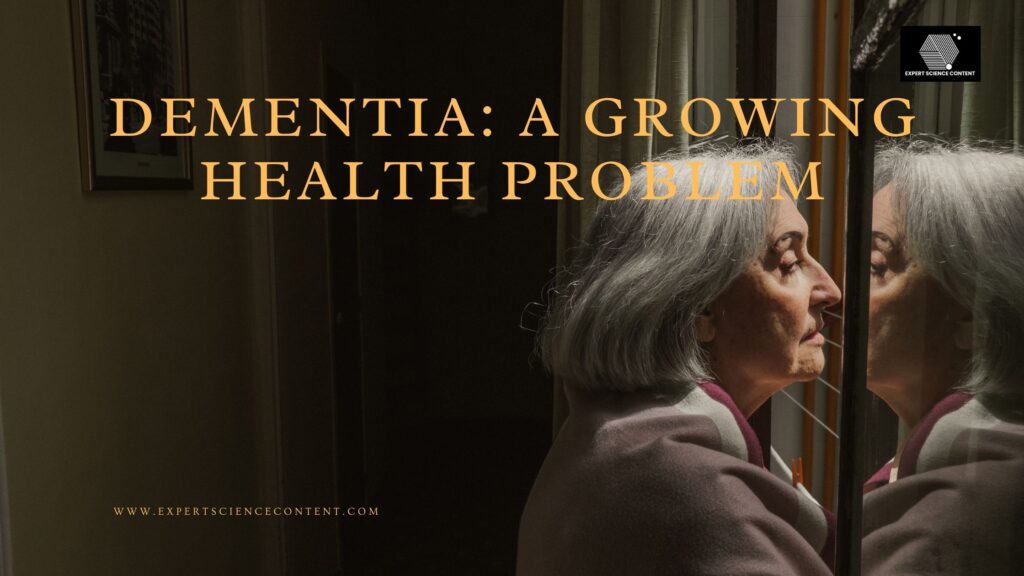Dementia: A Growing Health Problem
- Published By: Dr. Anindita Talukdar
- Published On: August 14, 2025
- 7 Minutes to read

Dementia is something we hear frequently these days at social or family gatherings. Someone in our family or among our relatives or a colleagues’d elderly parents may be living with dementia, highlighting the fact that it is increasingly becoming a critical public health issue, affecting millions of lives globally. The condition creates significant challenges for the individual, families, and healthcare systems. Despite its growing prevalence, the nature of dementia patients and treatment requirements remain poorly understood and frequently undiagnosed, especially in low- and middle-income countries. As we live longer, the need to understand this cognitive disorder becomes ever more important.
This blog explores what dementia is, types of dementia, how it differs from normal aging, the current global and national statistics, the importance of early diagnosis and treatment care, the financial impact, and most importantly, how we can reduce the risk and promote healthy brain aging.
What we need to know about dementia?
Dementia is a general term that refers to a cognitive disorder characterized by a gradual decline in cognitive functions, ranging from mild to severe.
Dementia interferes with a person’s daily activities by affecting their thinking, memory, reasoning, communication, and decision-making ability. Unlike temporary memory lapses, dementia significantly disrupts daily life and often leads to a loss of independence. It is not a single disease but an umbrella term that includes a variety of cognitive disorders. Dementia results from damage and shrinks to brain cells, which disrupts the ability to communicate effectively between different regions of brain cells. Such cognitive disorders can be caused due to diseases like Alzheimer’s, or physical changes in the brain caused by stroke or trauma.
One of the underlying causes of dementia is Alzheimer’s disease, the most common form of dementia, which is caused due to accumulation of beta amyloid plaques (abnormal clumps of a protein fragment) and tau tangles in brain cells and it disrupts normal brain functions and eventually leads to the death of brain cells.
What are the types of dementia
Dementia is an “umbrella category” describing mental declines affecting an individual’s daily life. Thus it is very essential to understand the types of dementia for its diagnosis, treatment, prevention and care. Each types of dementia affects the brain differently and presents unique symptoms.
Alzheimer’s disease is one of the most underlying causes of dementia, accounting for 60% to 80% of cases. This usually begins with difficulty in remembering recent events or slow understanding of regular activity, and progresses to confusion, disorientation, and behavior changes. Beta amyloid proteins and tau proteins- the key protein fragments for the brain cell, which plays the main characteristics for this form of dementia. They basically disrupt the communication between the nerve cells in the brain.
Vascular dementia is the second most common type of dementia, accounting for 5% to 10% of cases. It mainly results from poor blood circulation to the brain, often due to conditions like stroke or other vascular conditions. Symptoms may vary depending on which areas of the brain are affected and it may appear suddenly.
Lewy body dementia (LBD) is an umbrella term used for two similar types of dementia conditions. This type of dementia is associated with abnormal protein deposition of a protein in the brain called lewy bodies (alpha-synuclein). People with this condition often experience visual hallucinations, movement and balance problems, planning and problem solving issues and fluctuations in cognitive ability. LBD is the cause for 5% to 8% of dementia patients.
Frontotemporal dementia (FTD) primarily occurs due to damage of the frontal and temporal lobes in the brain. This condition occurs due to disposition of abnormal protein in these areas, often leads to personality changes, difficulty in language skills (difficulty in understanding the meaning of common words), inappropriate social behavior or motor coordination. FTD is the main cause of early dementia and between 5-6% of all dementias are FTD.
Lastly, mixed dementia occurs with a combination of more than one cause of dementia—most commonly Alzheimer’s and vascular dementia. This kind of mixed dementia can complicate diagnosis and treatment because of overlapping symptoms.
Dementia vs. normal aging
The most common misconception about dementia is that it is a natural part of aging, which leads to dementia patients untreated or delayed treatment. While aging most of the time can lead to certain memory changes, but dementia involves a significant and disabling decline in cognitive abilities hampering the accomplishment of regular activities.
Dementia patients Vs. normal aged person:
- A normal aged person occasionally forgets where he/she placed his glasses or struggles to recall a name, while a dementia patient gets lost in familiar places every time.
- A normal aged person occasionally finds it difficult to remember the right word and after sometime he can usually recover the word or rephrase. In dementia, individuals may experience difficulties in expressing his/her thoughts including trouble in understanding conversations.
- Normal aging can lead to minor adjustment with everyday tasks but dementia can cause significant impact on regular functioning including everyday tasks such as cooking, getting dressed, finance managing, and personal hygiene maintenance.
Thus significant impact of dementia on individuals leads to social withdrawal and this distinction is vital, as early recognition and medical attention can lead to better management and access to professional care.
Dementia Statistics
Dementia develops in individuals every 3 seconds and the rise in dementia cases is alarming and reflective for a rapidly aging global population. As per a recent survey:
- Over 58 million people are living with dementia globally in 2025.
- This number is projected to rise to 78 million by 2030, and 139 million by 2050.
- Every 3.2 seconds, someone in the world develops dementia.
- In the United States alone, 6.9 million people aged 65 and older are living with dementia—roughly 1 in 9 adults. In India 8.8 million Indians are currently living with dementia and in the United Kingdom around 7.1 million people are living with dementia.
- 60% of the dementia patients currently live in low and middle income countries and by 2050, this number will increase to 71%.
Unfortunately, many of these individuals have never received a formal diagnosis and treatment. In high-income countries, only 20% to 50% of dementia cases are identified, diagnosed and treated in primary care settings. In low-income countries, up to 90% of cases go undiagnosed.
Importance of Dementia Testing and Diagnosis
Early diagnosis of dementia is very important, not only for the individual but also for the families. It can allow individuals and families to better prepare for the future, seek appropriate dementia treatments, and maintain independence for as long as possible. Despite all this, many people in current day delay seeking medical help due to stigma, fear, or a lack of awareness.
Dementia diagnosis usually involves a combination of tests, includes:
1.Physical examination,
2.Cognitive tests,
3.Medical history check,
4.Brain imaging (MRI),
5.Lab tests to rule out other conditions.
An accurate step by step diagnosis is very important to get the proper guide/plan for treatment and care.
Early detection can provide emotional relief, and give access to valuable resources and support systems. Moreover, getting to know the type of dementia and the specific cause behind it can lead individuals to get personalized care and management strategies.
What is the cost of dementia care
The economic burden of dementia is big and it encompasses not only medical treatment and long-term care but also the unpaid labor of informal caregivers (spouses or children).
The global societal cost of dementia was estimated at US$ 1313.4 billion for 55.2 million people as per WHO and approximately 50% of these costs are attributable to care provided by informal carers.
In high income countries like the U.S., dementia-related care costs exceed $360 billion annually. The majority of these costs are shouldered by families, who often experience financial strain, lost productivity, and emotional distress. Adding to the complexity, up to 90% of people in aged care facilities with dementia display behavioral and psychological symptoms (BPSD), which increase the need for specialized care, medications, and support services.

Ways to lower your risk of dementia
While there are no cure for dementia and we cannot change risk factors like age or family history, there are several proactive steps or selfcare we can take to lower our risk:
- Physical Activity: Engaging in regular physical activity improves blood circulation to the brain and reduces inflammation, benefiting both heart and brain health
- Regular Health checkup: regular doctor visit is important to manage chronic conditions such as diabetes, hypertension, and high cholesterol is essential, as these can impair brain function.
- Addressing hearing loss: It has emerged as a surprisingly critical factor, hearing impairment can accelerate cognitive decline and lead to social isolation.
- Stop smoking and drinking: Limiting alcohol consumption and quitting smoking reduces the risk of strokes and brain damage—both of which are directly linked to dementia.
- Keep up your hobbies: Keep your hobbies alive, talk to your near and dear ones, do whatever makes you happy, learn new things every now and then. Write down everyday tasks and appointments to help you remember important things.
These strategies offer healthy mental health and hope, even for those with a genetic predisposition to the disease.
Healthy lifestyle
Adopting a brain-healthy lifestyle is one of the most effective ways to prevent or delay dementia. This includes:
- Staying mentally active by learning new skills, solving puzzles, writing and reading.
- Maintaining social connections, which can protect against depression and cognitive decline.
- Eating a healthy balanced diet, include proteins, fibers and carbohydrates in your diet everyday, eat fruits, vegetables, whole grains, fish, chicken, seeds and healthy fats.
- Prioritizing quality sleep, as poor sleep is associated with increased beta amyloid fragment buildup in the brain.
- Managing stress, which, when chronic, can negatively impact memory and thinking abilities.
These habits not only lower your risk of dementia but also contribute to overall well-being and longevity. Most importantly, the main lifestyle change for an elderly person is to stay mentally active—keep learning new things and engaging in new activities that keep the mind stimulated.
Final Thoughts
Dementia is undoubtedly a growing health issue, but there is always hope if diagnosed early. Thus, through early detection, healthy lifestyle choices, healthy social connection and greater public awareness, we can improve the quality of life for those living with dementia and reduce the future impact of this cognitive disorder.
If you or someone you love is experiencing these signs of memory loss or confusion, don’t wait. Reach out to a healthcare provider or take steps towards that direction. An early or timely diagnosis can open doors to prevention, treatment, support, and planning for the future.
Let’s work together to destigmatize dementia and create a world where people living with cognitive disorders are understood, supported, cared, and empowered. Visit our website to learn new discoveries or scientific awareness.
To learn more about science and scientific awareness, read our blog section.
References:
- Scientific publication: https://pmc.ncbi.nlm.nih.gov/articles/PMC3551235/
- Scientific publication: https://pubmed.ncbi.nlm.nih.gov/27998324/
- Scientific publication: https://www.jabfm.org/content/25/3/350.short
- Scientific publication: https://pubmed.ncbi.nlm.nih.gov/36637034/

Dr. Anindita Talukdar
The creative behind ESC sharing smart actionable tips and insights to level up writing and research skill.
Join ESC
Get our newsletter

Dr. Anindita Talukdar
The creative behind ESC sharing smart actionable tips and insights to level up writing and research skill.

Wow superb blog layout How long have you been blogging for you make blogging look easy The overall look of your site is magnificent as well as the content
Thanks a ton for the lovely feedback! Glad you like the website. 🙌 Keep an eye out—I’m excited to share more useful and interesting posts with you soon!
Wonderful beat I wish to apprentice while you amend your web site how could i subscribe for a blog web site The account aided me a acceptable deal I had been a little bit acquainted of this your broadcast provided bright clear idea
Appreciate your thoughtful comment! It’s great to know the blog resonated with you. Be sure to keep visiting—there’s lots more insightful blogs on the way!
Hi my family member I want to say that this post is awesome nice written and come with approximately all significant infos I would like to peer extra posts like this
Thank you so much for your kind words! I’m really glad you found the post helpful. Stay connected—there’s more valuable information blog coming your way soon!
Your blog is a treasure trove of knowledge! I’m constantly amazed by the depth of your insights and the clarity of your writing. Keep up the phenomenal work!
Thank you so much for the lovely feedback. Glad you find the blog insightful. Please visit the blog page. Every week we post insightful science and education topics. Please do share it with friends and family.
you are truly a just right webmaster The site loading speed is incredible It kind of feels that youre doing any distinctive trick In addition The contents are masterwork you have done a great activity in this matter
I do not even know how I ended up here but I thought this post was great I dont know who you are but definitely youre going to a famous blogger if you arent already Cheers
Your blog is a treasure trove of knowledge! I’m constantly amazed by the depth of your insights and the clarity of your writing. Keep up the phenomenal work!
I loved as much as you will receive carried out right here The sketch is tasteful your authored subject matter stylish. Nonetheless your command got an edginess over your skill. Great work, keep writing such information blogs
Your blog is a true hidden gem on the internet. Your thoughtful analysis and engaging writing style set you apart from the crowd. Keep up the excellent work!
Your point of view caught my eye and was very interesting. Thanks. I have a question for you.
Thank you for your sharing. I am worried that I lack creative ideas. It is your article that makes me full of hope. Thank you.
Your article helped me a lot, is there any more related content? Thanks!